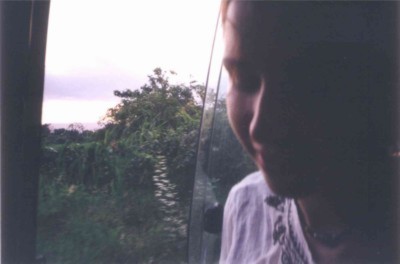 Dusty:Starlight:Culture
|
|
|
|
The Big Lie
2004-04-08 11:12 p.m. It's all so tempting, conformity. It's comforting, it's nearly impossible not to regulate your standards based on everyone else's. The notion has widely varying applications, from beauty to bank accounts, from dogma to career choice. It's a daily struggle for me, and I get pissed when I find myself believing it all. Take, for example, my irrational fears of Johannesburg. Last month I was not irrationally fearful of it. This month I was. I heard from Rob the South African (who resides in Jo'burg) via email, then remembered that I shouldn't be afraid. Telling me he'd send info about theater stuff going on reminded me that people live, not die, in Johannesburg, and that it's not quite the war-torn combat zone ignorant people or racists make it out to be. Funny how easy it is to forget that we are so isolated in the United States that we tend to believe exaggerated, nearly sensationalist reports about daily living in other parts of the world, no matter how much of a caricature or stereotype they've become. So how do I feel now? Considering I've booked myself and Steve a couple of nights here, I'd say all right. Parade endless statistics in front of us, and I'll say we know better. Tell me you saw something in the news or heard some warning, and I'll typically say it's way out of context, maybe founded on the West's fear of the "third world". So why is it that I do let all of the garbage sink in so easily? This goes beyond travel and my penchant for those countries that are not "developed" or are at least completely alien to everything I've ever known, as well. I was talking the other day, for example, to a colleague and I said something to the effect of: "We're taking this trip now, because next year we'd like to buy a home." Colleague says, "So?" I say, "So, when your a homeowner, you're kind of a slave to your house," repeating an old adage I've heard many a homeowner, new or old, recite. Thinking I'd get that knowing nod, I was actually caught quite off guard when he said "Theresa! My God! What a terrible metaphor!" Aside from being embarrassed, I was dumbfounded. Why didn't he agree? Everyone else did when I said that - no one else ever said differently. I said nothing, and he paused for a moment. He then leaned forward in his chair and said "You know what my wife and I did the weekend after we closed on our house in Maplewood?" I shook my head. "We took our last five hundred dollars and went to Paris for the weekend". I smiled. In front of me was a brilliant, brilliant man, whose scholarship I respected and outlook I admired. He was so successful, and yet didn't tell me what everyone else was - that what I had just said demonstrated "wise thinking" or something like that. I couldn't believe that suddenly there was another perspective available, that there was an alternative way of thinking about this "house" situation (or any other), and that it was coming from someone who's obviously been quite successful all his life - someone who has worked for all he has and hasn't had any particular financial edge over everyone else. Every single time, now, I find myself falling back into that conventional thinking - that blind nodding I do when I hear such negativity being expressed, I'm able to catch myself more and stop. I'm able to say "Isn't there another way to think about that that isn't so...depressing?" Is this the good part of being a grown-up? Thomas has helped too. I mumbled something the other day about being "sick of paying rent", and he turned to me, in his Thomas way, and said "What are you, twenty five?" I nodded. He looked away for a minute, nodding his head. He turned back again. "Didn't you just move out of your mom's house?" Sure, "just" is oh, more like two and a half years at this point, but who's counting? He made his point - sometimes getting sucked into everyone else's complaints, without even realizing I'm suddenly adopting them without thinking, just repeating them because it's what the common disdain is makes me sound like a bitter old woman or something. So there it is, my version of conformity - I hear everyone else complaining about real estate, gas prices, their own children; I use metaphors about houses-as-oppressors, children-as-energy-suckers, and I don't even think about the implications of what I'm saying. What a depressing way to look at life and your own choices; what a horrible daily grind you're creating for yourself when your perspective is so limited. It's always been so easy for me to say, for example, "Oh children are so much work!" if the subject of "family" comes up. I started to say something to that effect the last time it was being discussed, but I stopped myself. What are the implications of saying something like that? Sure it's true, in some sense, but that's usually where the statements stop - and what a terrible place to leave it all. Children are a joy, a pleasure, children help us learn about ourselves and bring new perspectives into our lives. While we watch them learn and figure out the world, we can do so all over again through them. How lucky we are to be able to have that - what a beautiful choice we can make to bring that into our lives. Seems like most people "know" this is true too. So why focus mostly on that "work" part - why in that simple statement do we choose to represent only the "negative" or the "difficult"? Does focusing elsewhere seem too pollyanna-ish or something? Too hallmark? Too Oprah? TV tells us that kids are work, that we're a slave to our house, that renting is pissing one's money away. Can there be no other way to conceive of all that? Endless images of people suffering because of all these things remind us that in daily conversations – whether small talk or “serious” discussion with our intimate friends – we’re supposed to think a certain way, that we're supposed to be encouraging, perpetuating, and reinforcing in each other this limited negativity. Some days I think if I were a different person, a little slower, a little more pliable, I'd be a friggin mess because of all the TV I watch. It’s not the watching, per se, not even the programs – it’s the messages that come through, the cultural ideas or climates created that really distort our perception of reality and restrict our way of thinking. Luckily, momma didn't raise no fool. But what if she did? In the half hour that I watched yesterday, I saw 12 (that's TWELVE) commercials for drugs (did I mention that was over the span of HALF AN HOUR?). Asthma stuff, depression stuff, stomach stuff, allergy stuff. Erectile dysfunction stuff, bladder stuff, cholesterol stuff, heart stuff. If I were a little less "aware", I might just run my little butt over to the doctor to make sure I shouldn't be on some kind of pill, since it seems like the rest of the world is. Why yes, sometimes my stomach DOES hurt! Why yes, I DO get headaches! Why yes, sometimes I DO feel afraid of group settings! Why yes, some days I DON’T even recognize myself in the mirror! I MUST need these drugs! I want to be like the people in the commercials, wind-surfing without a care in the world because the pill has helped their herpes, asthma, allergies, blood pressure, depression, and/or erectile dysfunction!! When I had my crying fit on the floor last week because I was over tired, worried about a friend, and stressed about school, I might just think, if I was that other person, that this just proves why I need a pill; I cannot control my emotions. I cannot focus. I might just suddenly categorize myself as “extremely moody”. I might just suddenly decide that I must need a pill, that this normal human reaction must be abnormal, that it must be immediately controlled, that this “problem” needs immediate attention; a solution that everyone else relies on, like drugs. The frightening thing is, doctors might too, even though the situation was temporary and has since rectified itself. I have no doubt that drugs for people who really need them are a beautiful thing. But does everyone need them this much? Has it suddenly become a 12-commercials-worth kind of climate? How easy it is to slip into that manufactured mode of thinking when we’re bombarded with these images every day, dozens of times a day. It’s hard to say losing my father at fourteen had “positive” impacts on my life. But if it did, perhaps it is this: my ability to remember to make problems relative – that no matter what, I am alive. My father’s death gave me the ability to have a perspective no teenager should have; it stripped me of my naïveté and propelled me into adulthood. It was tough, but in the long run I have to be grateful for that. It was lonely – feeling isolated in my pseudo-adult state, I found it hard to care about social, youthful stuff – who was dating who, who “hated” me one week and “loved me” the next, the games people play in the politics of friendship. I still do find stuff like that hard to care about. It made it hard for me to relate to other people my own age. In fact, I still have that problem sometimes. I’d like to say this resulted in some extreme advancement on my part, but it didn’t. Closer to the truth, I’d say I flip flopped a lot, trying to fit in and being mad at myself when I just couldn’t be like everyone else. But the advantage I did have on the big, bad, mean scary world was that I had under my belt already an extremely traumatic and devastating experience – it seemed like as bad as things got, they could get worse. Maybe that’s what kept me sane, what kept things in perspective, and what lets me, to this day, catch my breath and think before taking a pill, overreacting, or getting hysterical. Have we become so overly-medicated, so reliant on quick solutions, so negative and restricted in our view of things that we’ve forgotten to actually think about what we’re saying, what we’re doing, what we’re putting in our bodies? Have we ceased to opine or discuss or contemplate, letting the TV think for us? Tell us how we feel and how we should heal? Tell us how to conceive of homes, children, money, Johannesburg? I was all caught up in buying property, and how important it was to “build equity”. How I wasn’t “getting any younger” (!) and how at this point I should be “investing in my future”. These things are true in their purest forms, but to the extent they’ve been pushed on me? I’m dubious. I stumbled across an old, overlooked Tolstoy story, “How Much Land Does A Man Need?” Catchy titles suck me in, and this one was in the form of a question (clever buggar!). Flipping through it, I discovered the simple story of a man who kept buying property – more and more and more. He’d buy the farm next to him, and then the farm behind him, and then the farm in front of him, all at the advice of people in his life who’d told him to “prepare for his future” and build a good life. He’d had a lot of land – all he could afford – and started thinking of ways he could buy more. In the process of this thinking, he passed away. Friends buried him someplace on his land and then sold the rest off. The answer to the question – how much land does a man need? Six feet. Enough to fit a coffin. You never know. Life is like that. We can prepare and prepare and prepare. We can be safe and stay out of Johannesburg. We could save every penny and buy every house on the block. We could also get hit by a bus the day after. Life, she’s funny like that. And when she thinks you’re getting a little too comfortable, a little too high on yourself or egotistical, thinking you can control her, she’ll throw a mighty mess your way. Perspective is a beautiful thing, no? Maybe your day wasn’t so bad after all. Xoxox
je ne regrette rien - Edith Piaf
|
||




